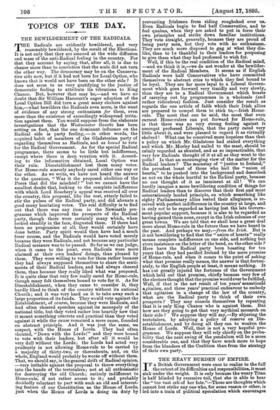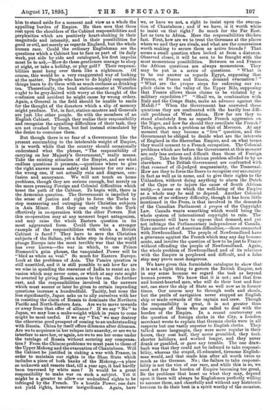THE HEAVY BURDEN OF EMPIRE.
IF a British Government were once to realise to the full the extent of its difficulties and responsibilities, it must sink under the weight. It is only because the weary Titan is half blinded by excessive toil, that she is able to bear the " too vast orb of her fate."—Those are thoughts which cannot but strike any one who, for some reason or other, is led into a train of political speculation which encourages him to stand aside for a moment and view as a whole the appalling burden of Empire. He then sees that there rest upon the shoulders of the Cabinet responsibilities and perplexities which are positively heart-shaking in .. their magnitude and intensity, and in their possibilities for good or evil, not merely as regards England, but the whole human race. Could the ordinary Englishman see the questions which a Cabinet has to face as part of its daily work, put side by side and catalogued, his first impulse must be to ask,—How do these gentlemen manage to sleep at night, or take a holiday, or play golf ? Their responsi- bilities must hang over them like a nightmare. Of course, this would be a very exaggerated way of looking at the matter. People who have to do highly responsible things learn to do them with as much coolness as drinking tea. Theoretically, the head station-master at Waterloo ought to be grey-haired with worry at the thought of the confusion and accident he might cause by wrong orders. Again, a General in the field should be unable to smile for the thought of the disasters which a slip of memory might produce. Yet, in fact, station-masters and Generals are just like other people. So with the members of an English Cabinet. Though they realise their responsibility and recognise the appalling difficulties of their task, they are not crushed by them, but feel instead stimulated by the desire to overcome them.
But though there is no fear of a Government like the present succumbing to the intolerable weight of Empire, it is worth while that the country should occasionally understand what the phrase, " The responsibility of carrying on her Majesty's Government," really means. Take the existing situation of the Empire, and see what endless questions it presents,—questions where to give the right answer means safety and honour for our race ; the wrong one, if not actually ruin and disgrace, con- fusion and annoyance. We will not touch on home problems, though they are serious enough, but merely on the more pressing Foreign and Colonial difficulties which beset the path of the Cabinet. To begin with, there is the Armenian question. The Government is impelled by the sense of justice and right to force the Turks to stop massacring and outraging their Christian subjects in Asia Minor. But they can only reach the Turk effectively in co-operation with the other Powers. But this co-operation may at any moment beget antagonism, and may raise the whole Eastern question in its most aggravated form. Could there be a stronger example of the responsibilities with which a British Cabinet is faced ? They have to save the Christian subjects of the Sultan, yet a false step in doing so might plunge Europe into the most terrible war that the world has ever known—the war in which, to use Prince Bismarck's grim phrase, the vanquished Power will be "bled as white as veal." So much for Eastern Europe. Look at the problems of Asia. The Pamirs question is still unsettled, and it is still possible to ask how far are we wise in spending the resources of India to resist an in- vasion which may never come, or which at any rate might be averted by giving Russia access to the sea. Go further east, and the responsibilities involved in the answers which must sooner or later be given to certain impending questions increase a hundredfold. Tacitly, but none the less significantly, Japan asks us to ally ourselves with her in resisting the claim of Russia to dominate the Northern Pacific and North-Eastern Asia. Are we to move towards or away from that offer of alliance ? If we say " No " to Japan, we may lose a make-weight which in years to come might be most useful. If we say " Yes," we may destroy the otherwise good prospect of coming to an understanding with Russia. China by itself offers dilemma after dilemma. Are we to acquiesce in her relapse into anarchy, or are we to interfere to save her, or again, are we to see her come under the tutelage of Russia without securing any compensa- tion ? From the Chinese problems we must pass to those of the Upper Mekong and the evacuation of Chantaboon. Will the Cabinet be justified in risking a war with France, in order to maintain our rights in the Shan State which includes a piece of both banks of the Mekong,—a place so unknown and remote that, till a year ago, it had hardly been traversed by white men ? It would be a great responsibility to make war on such a subject. Yet it might be a greater to allow our undoubted rights to be infringed by the French. To a hostile Power, one dare not yield rights, however insignificant. Again, have we, or have we not, a right to insist upon the evacua- tion of Chantaboon ; and if we have, is it worth while to insist on that right ? So much for the Far East. Let us turn to Africa. Here the responsibilities thicken- fast. First, how are we to treat the Germans at the places where we and they are rivals, and what are the concessions. worth making to secure them as active friends ? That seems a small question when looked at from a distance. Observed closer, it will be seen to be fraught with the most momentous possibilities. Between us and Franc© the African questions are always momentous. They may be put in a series of questions. " What is to be our answer as regards Egypt, supposing that France, or France and Russia, demand evacuation ? " " What are the proper steps for enforcing our ex- plicit claim to the valley of the Upper Nile, supposing that France allows those claims to be violated by a military expedition ?" " Shall we, in combination with Italy and the Congo State, make an advance against the Mandi ?" When the Government has answered these questions they are confronted with the hardly less diffi- cult problems of West Africa. How far are they ta stand absolutely firm as regards French aggression on the Niger, and how far should they conciliate the French ? Take, again, such a problem as that of Morocco. At any moment that may become a, " live " question, and the Government be obliged to decide what are the interests of England in the Shereefian Empire, and on what terms they would consent to a French occupation. The Colonial. problems which are before the Government at this moment are only less serious and difficult than those of Foreign policy. Take the South African problem alluded to by us elsewhere. The British Government are confronted with that remanet of ill-judged magnanimity, the Transvaal. How are they to force the Boers to recognise our suzerainty in fact as well as in name, and to give their rights to the ITitlanders, without doing anything to alarm the Dutch of the Cape or to injure the cause of South African unity,—a cause on which the well-being of the Empire as a whole may be said to depend. Another Colonial problem of no ordinary difficulty, though it has been little mentioned in the Press, is that involved in the demands of the Canadian Parliament a propos of the Copyright. Law. Canada wants something which would bring the, whole system of international copyright to ruin. The. Government will have to oppose that demand, and yet not infringe the Parliamentary independence of Canada. Take another set of American difficulties,—those connected with Newfoundland. The people of Newfoundland have a grievance against the French which may any day become acute, and involve the question of how to be just to France- without offending the people of Newfoundland. Again), the whole problem of Newfoundland and of its relations with the Empire is perplexed and difficult, and a false- step may prove most dangerous.
We have given this formidable catalogue to show that. it is not a light thing to govern the British Empire, not in any sense because we regard the task as beyond. human powers. We know that it is not ; and that firm and honest-hearted men, who will do their best and fear not, can steer the ship of State as well now as in former times. Our course may be through reefs and shoals,. but the perils of navigation never stopped an English ship or made cowards of the captain and crew. Though the responsibility is great, it is not greater than. the courage of those who are called to deal with the burden of the Empire. In a recent controversy on the question of foreign clerks in the City, a London. merchant wrote to explain that German clerks were in all respects but one vastly superior to English clerks. They talked more languages, they were more regular in their. hours, they cost half, they never grumbled, they took shorter holidays, and worked longer, and they never drank or gambled, or gave any trouble. The one draw- back was that they could not be induced to take responsi- bility, whereas the stupid, ill-educated, tiresome English-. man would, and that made him after all worth twice as much as the German. No ; the failure to take responsi- bility is not the vice of our race, and while this is so, we need not fear the burden of Empire becoming too great..' Be the problems that beset us what they may, depend upon it there will always be Englishmen perfectly willing to assume them, and cheerfully and without any histrionic heroism to do their best in a spirit worthy of the occasion..



































 Previous page
Previous page